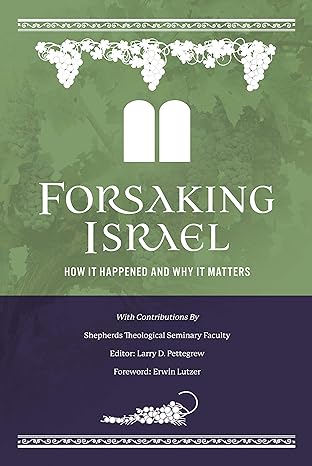A Book Review from Books At a Glance
by B. Jason Epps
Forsaking Israel is an anthology created by the faculty members of Shepherd’s Seminary, which is a lay seminary with the goal to better equip the church. Chapters are written by various authors, but they all have an approachable writing style.
As this book is an anthology, it covers multiple areas related to both the history of why the church had forsaken Israel and why Israel’s position is important. The book can be subdivided into two sections: how the church forsook Israel and why it matters. The first section of the book is essentially a broad overview of church history. The first chapter deals with the animosity that the church fathers had with Jewish people and that the Jewish community had with the church fathers. The second chapter discusses how Augustine transitioned from believing that there was a future for Israel to taking the spiritualized position concerning Israel because of the fall of Rome. The third chapter discusses the Reformers, most notably Luther, and his antagonism against the Jewish people. Chapter four deals with Israel’s special status and election. Chapter five covers the historical development of covenantalism and the tendency to remove Israel from Old Testament promises and covenants.
Beginning section two, which focuses on why it matters, there is an assessment of covenant theology which breaks down its arguments and analyzes the problems in regard to the covenantalist views on Israel. Chapter seven is a general introduction to dispensationalism, while chapter eight is a thought exercise regarding the dispensationalist/premillennial viewpoint, allowing readers to see how the dispensational thought process functions together and why the premillennial viewpoint is important for that system. Chapter nine deals with the discussion of the Olivet discourse and the four different general interpretations of it, comparing and contrasting them, ultimately demonstrating how the premillennial position accounts for the problems in the other views. In the final chapter, they discuss all of Romans 11 and its impact and implications on Israel. In their discussion of Romans 11:25–27, the author argues that there is a partial hardening of Israel, but when the fullness of the Gentiles comes in, Israel as a nation will be saved. However, he does not specify whether that includes every single Jewish person who existed at that time or if it refers to past Israelites. It seems, based on the context that the author holds, that all of Israel existing at that moment will be saved.
One element that exists in the second half of the book that is helpful to readers is the quasi-thought experiment where the author encourages the reader to follow the dispensationalist line of thinking in order to see the interconnectedness of their theological positions, for example, premillennialism, so that the reader can understand both how these components function and why they are important.
In general, the authors of this book do a fantastic job of surveying a large amount of material and presenting it in an explainable way. The authors also excel at accurately presenting alternative viewpoints, which ultimately helps strengthen their case. Personally, I found the second half of the book to be of greater help since, as sad as it is, there is nothing we can do to change the checkered past of the church to the Jewish people. But the second half of the book demonstrates both the importance of the Jewish people and offers us the opportunity as Gentiles to support the Jewish people and not fall prey to the sins of the fathers.
In conclusion, not only is this book accessible to the average reader, but it is thorough and fair in its analysis of differing viewpoints. As such, this book would serve as a great addition to a small group or book study for anyone who desired to have an understandable, thorough, entry point into this complicated discussion.
B. Jason Epps
Midwestern Baptist Theological Seminary
Buy the books

FORSAKING ISRAEL: HOW IT HAPPENED AND WHY IT MATTERS, edited by Larry D. Pettegrew